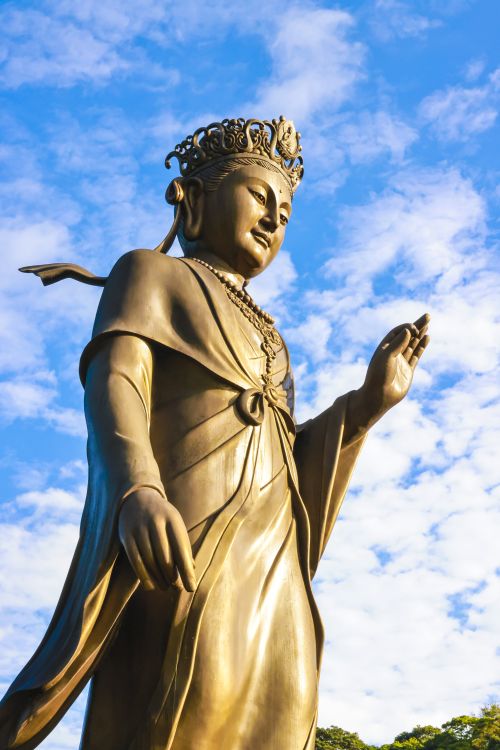Special Topics
Q1: Why is Guanyin known as “Guan-shi-yin” in Chinese Buddhism?
 Bodhisattva Guanyin is one of the bodhisattvas who are most familiar to Buddhists. In one of the most popular and well-known Buddhist sutras, The Lotus Sutra's Universal Gate Chapter on Bodhisattva Guanyin, the Buddha introduced this mahāsattva with great supernormal powers. Through this series of Q&A articles, let us learn more about Bodhisattva Guanyin, or Guanyin, who is capable of appearing in universal manifestations, to rescue sentient beings from suffering upon hearing their cries for help.
Bodhisattva Guanyin is one of the bodhisattvas who are most familiar to Buddhists. In one of the most popular and well-known Buddhist sutras, The Lotus Sutra's Universal Gate Chapter on Bodhisattva Guanyin, the Buddha introduced this mahāsattva with great supernormal powers. Through this series of Q&A articles, let us learn more about Bodhisattva Guanyin, or Guanyin, who is capable of appearing in universal manifestations, to rescue sentient beings from suffering upon hearing their cries for help.A: At the beginning of the 25th chapter of the Lotus Sutra, also known as The Lotus Sutra's Universal Gate Chapter on Bodhisattva Guanyin, Bodhisattva Inexhaustible Intent (In Sanskrit, Bodhisattva Aksayamati) asked a question for the sake of all sentient beings, "For what reasons is Bodhisattva Guanyin also called Guan-shi-yin?" The Buddha replied, "If innumerable hundreds of thousands of myriads of koṭis of sentient beings who experience suffering hear of Bodhisattva Guanyin and wholeheartedly recite his name, Bodhisattva Guanyin will immediately perceive their voices and free them from their suffering." Bodhisattva Guanyin had practiced the Dharma method of perfect penetration through the faculty of hearing in the causal stage. As a result, he is able to hear all sentient beings’ calls for help and is ready to release their suffering at any time and place using skillful means to deliver them. Therefore, this Bodhisattva possesses the epithet "Guan-shi-yin" (observing the sounds of the world).
In Sanskrit Buddhist texts, Bodhisattva Guanyin's name is Avalokitesvara. When Buddhist sutras spread to China, Bodhisattva Guanyin's name was translated into various Chinese epithets by different Buddhist sutra translators, such as "Guan-shi-yin" (觀世音), "Guang-shi-yin" (光世音), "Guan-shi-zi-zai" (觀世自在), "Xian-yin-sheng" (現音聲), and "Guan-zi-zai" (觀自在). Since Kumarajiva's translation of The Lotus Sutra's Universal Gate Chapter was widespread throughout China and has remained popular to this day, many Chinese Buddhists still refer to this great bodhisattva as "Guan-shi-yin."
As Master Ji Zang from the Sui Dynasty pointed out in the Commentary on the Meaning of the Lotus Sutra, the epithet Guanyin contains three meanings, including "Guanyin – observing the sentient beings' cries for help and heading forth to rescue them," "Guan-shi-yi – observing the sentient beings' thoughts and heading forth to rescue them," "Guan-shi-shen – observing the sentient beings' bodies that which suffer, and heading forth to rescue them." Why did Kumarajiva translate the epithet into Chinese only as "Guan-shi-yin"? Firstly, when reciting Bodhisattva Guanyin's name, we are able to purify our bodily and mental actions. Secondly, the practice method of reciting this bodhisattva's name perfects our cultivation while concurrently benefiting others. Finally, owing to the Bodhisattva's past actions and vows, he will immediately respond to our calls when we recite his name with a one-pointed mind, by going forward to save and rescue us regardless of what disasters have befallen us. Thus, the Bodhisattva was named according to his compassionate actions and vows.
In his book "The Origin and Development of Early Mahayana Buddhism", Elder Master Yin Shun pointed out that in early Buddhism, "to observe sentient beings in the world with great compassion" is a characteristic unique to buddhas. Another profound skill that is distinctive of all buddhas is the ability to universally enter the eightfold assembly and manifest in their forms, in order to preach the Dharma to them. Therefore, in Mahayana Buddhism, Bodhisattva Guanyin possesses the special virtue of great compassion, and can manifest himself in various different forms to deliver sentient beings who are suffering. In fact, this ability is identical to that of a buddha. Therefore, "Bodhisattva Guanyin, according to popular Buddhism, has inherited Shakyamuni Buddha's spirit of observing the world with great compassion, thereby achieving his special legacy."
Extended reading:
Q1: Why is Guanyin known as "Guan-shi-yin" in Chinese Buddhism?
Q2: From which kinds of suffering does Bodhisattva Guanyin liberate us from?
Q3: How does Bodhisattva Guanyin hear sentient beings' cries for help?
Q4: How does Bodhisattva Guanyin rescue sentient beings?
Q5: How do sentient beings resonate with Bodhisattva Guanyin?
Q6: Why does Bodhisattva Guanyin often manifest into a female form, if he has a myriad amount of manifestations?
Q7: Is it especially efficacious to pray and ask Bodhisattva Guanyin for a child?
Q8: Why didn't Bodhisattva Guanyin accept Bodhisattva Inexhaustible Intent's offerings?
Q9: What is the meaning of the term "Universal Gate" from the Lotus Sutra's Universal Gate Chapter on Bodhisattva Guanyin?
Resource: Humanity Magazine #386 (人生雜誌第386期)
Translation: Ariel Shen (沈純湘)
Edited by: Keith Brown, Chia-Cheng Chang (張家誠)
Photo: Quan Tsai (蔡全)
